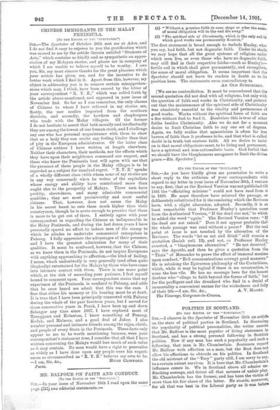CHIls - ESE IMMIGRANTS IN THE MALAY PENINSULA. (To rim EDITOR OF
TEE "SPECTATOR.") Slu,—The Spectator of October 26th met me at Aden, and I do not find it easy to express to you the gratification which was caused to me by the article therein entitled "Students of Asia," which contains so kindly and so sympathetic an appre- ciation of my Malayan stories, and places me in company of which I am unable to believe myself to be worthy. I owe you, Sir, my most sincere thanks for the great pleasure which your article has given me, and for the incentive to do better work which I find in it. Apart from this, however, my object in addressing you is to remove certain misapprehen- sions which may, I think, have been caused by the letter of your correspondent "X. Y. Z.," which was called forth by the article above-mentioned, and appeared in your issue of November 2nd. So far as I can remember, the only classes of Chinese to whom I have referred in my stories are, firstly, the raw coolies imported from the southern districts, and secondly, the hawkers and shopkeepers who trade with the Malay villagers. Of the former I do not hesitate to assert that both morally and intellectually they are among the lowest of our human stock, and I challenge any one who has personal acquaintance with them to show that as a body they can excite any feeling kinder than that of pity in the European administrator. Of the latter class of Chinese settlers I have written at length elsewhere. Neither their characters, their methods, nor the effects which they have upon their neighbours command our respect, and those who know the Peninsula best will agree with me that the presence of these people in the Malay villages is to be regarded as a subject for unmixed regret. "X. Y. Z." speaks of a wholly different class (with whom none of my stories are in any way concerned) when he writes of the capitalists whose energy and ability have contributed more than aught else to the prosperity of Malaya. These men have probity, shrewdness, and many admirable commercial qualities ; they are most praiseworthy and most useful citizens. That, however, does not cause the Malay in his secret heart to rate them much higher than their countrymen, though he is acute enough to perceive that there is more to be got out of them. I entirely agree with your
correspondent in regarding the Chinese as indispensable in the Malay Peninsula, and during the last dozen years I have personally spared no effort to induce men of the stamp to which he alludes to undertake commercial enterprises in Pahang. I fully appreciate the advantages of their presence, and I have the greatest admiration for many of their qualities. It must be confessed, however, that the Chinese, as we know them in the Peninsula, do not inspire Europeans with anything approaching to affection,—the kind of feeling,
I mean, which undoubtedly is very generally (and often quite illogically) entertained for the Malays by those who have come into intimate contact with them. There is one more point which, at the risk of exceeding your patience, I feel myself bound to comment upon. Your correspondent states that my experience of the Peninsula is confined to Pahang, and adds that he once heard me admit that this was the case. I fear that either his memory or his hearing must be at fault. It is true that I have been principally connected with Pahang during the whole of the past fourteen years, but I served for three consecutive years in Perak, I have been up and down Selangor any time since 1887, I have explored most of Trengganu and Kelantan, I know something of Penang, Kedah, and Malacca, and a good deal of Johor. I also number personal and intimate friends among the rajas, chiefs, and people of every State in the Peninsula. These facts only appear to me to be worth mentioning because, were your correspondent's statement true, I consider that all that I have written concerning the Malays would lose much of such value as it may contain. No man would have a right to generalise as widely as I have done upon any people were his experi- ences so circumscribed as "X. Y. Z." believes my own to be.
Paris.














































 Previous page
Previous page